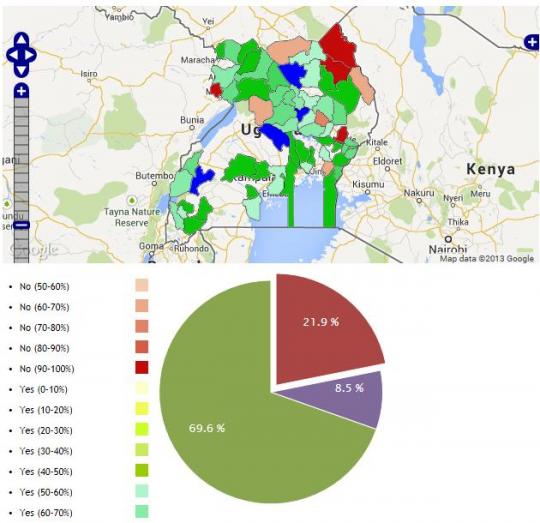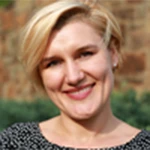 This blog on a new user case of U-Report for targeted beneficiery feedback in Uganda was authored by Kidus Fisaha Asfaw with contributions from Merrick Schaeffer and Lyudmila Bujoreanu
This blog on a new user case of U-Report for targeted beneficiery feedback in Uganda was authored by Kidus Fisaha Asfaw with contributions from Merrick Schaeffer and Lyudmila Bujoreanu
Inspired by the success of using U-report to map and mitigate the spread of Banana Bacterial Wilt disease in Uganda’s banana crops, the World Bank team from the ICT unit (TWICT) decided take U-report’s functionality a step further by establishing an on-going dialogue with students, parents and teachers, who are direct beneficiaries of the Uganda Post Primary Education and Training Project (UPPET) project.
By tapping into Uganda’s network of over 236,000 U-reporters built by UNICEF, a joint ICT/UPPET team was able to identify and poll over 5,000 teachers, students, and parents associated with school supported by UPPET. Throughout the summer, we have engaged these “special school reporters” in a series of mobile based SMS polls structured around their experiences with the use of the new textbooks and science kits supplied by the project. The responses from beneficiaries are providing useful insights from the field that are expected to improve the ongoing UPPET operation and provide useful inputs to the client in improving the utilization of learning resources in schools.
What makes this initiative phenomenal has been U-report’s capacity to collect targeted beneficiary feedback in a remarkably short time, and with a wide reach. Within two months, thousands of Ugandans had a channel to have their voices heard on a program that directly affected them. Furthermore, having identified beneficiaries who are willing to report, present a great opportunity to continue engaging this network of parents, teachers and students in discussions that could help the World Bank and the Ugandan Government distill lessons learned for current and future education programs. This initiative is a prime example of how U-report is being strategically incorporated into World Bank operations to institute data-driven decision making, increase accountability in public service delivery and improve citizen engagement.
This most recent user case of U-report in Uganda provides four key lessons which could be further extended into World Bank operations:
- It’s not all about the technology but also about networks of people. What makes U-report effective and popular is not simply the technology it is built on, but the vast network of Ugandan’s it has been able to connect over national dialogues. With a single poll, our team was able to identify 5,000 Ugandan, who are direct beneficiaries of a World Bank project, and we were able to target questions directly to them through SMS. There might be several technologies which have the same functionality as U-report, but only U-report has the network of 200,000 users who voluntarily signed up and willing to report on issues that matter to them. It might be worth considering building networks of reporters similar to U-report in other countries that would allow every World Bank supported project to receive similar feedback rather than focus on engagements limited to a single operation.
- Targeted beneficiary feedback matters. In a recent blog this summer, Chris Vein and Aleem Walji highlight how we often over-supply what people don’t need and under-supply what they do. This leads to the crucial role of getting real-time feedback from the beneficiaries of Bank financed operations. In this case, the critical innovation was the ability for technology to identify a network of sub-users to effectively collect targeted beneficiary feedback in real time.
- Do not reinvent the wheel if you can; leverage existing technologies. U-report has a proven track record for reaching out to Ugandans, and the TWICT team recognized this when it leveraged its capabilities to conduct this initiative. If the same study was designed from scratch using a custom product, the likelihood that the initiative would have succeeded would be very slim. The intent of UNICEF’s investment in a Ugandan ICT ecosystem was for reuse by other organizations and government agencies, and the World Bank’s ability to have done just that is a testament to how leveraging existing technologies is powerful.
- Technology can become a public good through an open source framework. U-report is open source, free and intended to serve as a shared web service. This makes U-report a tool available for any organization to use and/or replicate in a different country/sector. With similar initiatives like this one, which costs anywhere from $500k-$2 million to build and operate, leveraging an effective open source tool like U-report has enabled for this to happen at an estimated cost of about $10,000 (the cost of SMSs plus a data analyst). The return on investment through such a public good, can potentially transform how the World Bank and other development partners think about open source technology and leveraging existing innovation and networks. Other NGOs, UN Agencies and Ministries in Uganda are using U-report to engage citizens on a multitude of programs making the initial investment that UNICEF made truly a public good.



Join the Conversation